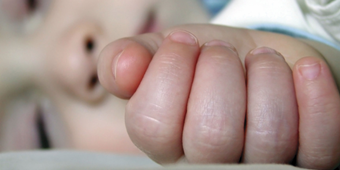Smoking, Drinking, And Other ‘No-Nos’ When Breastfeeding

Answer a few questions and we'll provide you with a list of primary care providers that best fit your needs.
Looking forward to a cold beer, glass of wine, or your favorite smoke once your bundle of joy arrives? Not so fast. If you’re breastfeeding, what you ingest or inhale can still reach your precious little one. That tiny life that depended on you during pregnancy for growth and development continues to rely on you now.
“We’ve got two people to think about here,” explains Maria Greene, RN, BSN, IBCLC, certified child birth educator and internationally board-certified lactation consultant with Premier Health.
Chemicals from cigarettes, alcohol, and marijuana can pass through your breast milk and potentially harm your baby. So when considering these activities, it’s a good idea to think twice – once for yourself and once for your baby.
Is Smoking Harmful To My Baby If I Breastfeed?
 You’ve made it through pregnancy either without a single cigarette or perhaps a reduction in your smoking. Congratulations and keep it up! Your developing baby will still greatly benefit from a smoke-free environment.
You’ve made it through pregnancy either without a single cigarette or perhaps a reduction in your smoking. Congratulations and keep it up! Your developing baby will still greatly benefit from a smoke-free environment.
“Since a newborn’s airways are so small, there’s more of an impact if they get inflamed or constricted,” Greene explains.
Reasons to avoid smoking and secondhand smoke:
- Infants of smokers are at increased risk of colic, respiratory infections, and SIDS (sudden infant death syndrome).
- Nicotine can cause your baby to be more fussy or irritable.
- Smoking cigarettes or chewing tobacco may reduce your milk production and inhibit the let-down reflex.
- Babies exposed to secondhand smoke are at increased risk for health issues such as ear infections, asthma, and SIDS.
If you’re struggling with avoiding cigarettes, experts agree that breastfeeding is still the best choice you can make, with health benefits for both you and your baby.
La Leche League International offers these recommendations for minimizing the potential effects of smoking on your baby’s health:
- Smoke as far away from your baby as possible (outside is best).
- Cut down on smoking.
- Monitor your baby’s weight gain.
- Smoke right after breastfeeding instead of just before.
- Wear an outer layer of clothing that can be removed after you smoke to reduce baby’s exposure.
Can I Still Have Alcohol When Breastfeeding?
While avoiding alcohol is the safest option for your baby’s health, you can still kick back with an occasional drink as long as you’re cautious with the amount and timing.
Research shows that the amount of alcohol in breast milk peaks 30 to 60 minutes after your last drink. Alcohol can remain in your system for up to three hours. So if you choose to drink, have only one drink, limit frequency, and avoid breastfeeding or pumping milk until your body has had time to clear the alcohol from your system.
Another option is to store expressed breast milk for those occasional times you plan to have alcohol.
Greene says to be wary of test strips that claim to detect alcohol in breast milk. They can be unreliable. Waiting several hours to breastfeed is the best approach.
More to think about:
- Heavy alcohol consumption can reduce breast milk output, cause drowsiness in baby, and impair a mom’s ability to care for baby.
- Frequent, excessive alcohol intake during breastfeeding has been linked to an increased risk of disrupted sleep for baby, slow weight gain, delayed motor development, and even cognitive delay later in life.
- Pumping and then dumping breast milk will not speed up the rate of alcohol elimination from your body, nor will drinking a lot of water, resting, or drinking coffee. However, if you’re consuming several drinks, pumping and dumping will protect your milk supply and prevent breast engorgement.
What About Marijuana And Breastfeeding?
Despite nonmedical marijuana’s increasing legalization, no amount of marijuana has been proven safe to use during pregnancy or while breastfeeding, according to the American Academy of Pediatrics. Both the AAP and the American College of Obstetrics and Gynecologists recommend that breastfeeding moms avoid the substance.
Research has shown that chemicals from marijuana pass through your breast milk to your baby through smoking, vaping, and consumption of edibles and drinkables. Studies also show that marijuana use during pregnancy and breastfeeding may have negative effects on a baby’s developing brain.
More to think about:
- The THC concentration in weed has quadrupled since the 1980s. (THC, or tetrahydrocannabinol, is the chemical in marijuana that produces the high sensation.)
- Some CBD (cannabidiol) products may contain pesticides, heavy metals, bacteria, and fungus that can harm you and your baby.
- THC is stored in body fat and slowly released over time, extending your baby’s exposure.
- Passive exposure (secondhand smoke) from someone who’s smoking weed can potentially affect your baby since THC can enter your blood and then pass to your baby through your breast milk.
- Your ability to care for your baby can be impaired while using marijuana.
“Remember, you’re the primary source of protection for your baby,” Greene says. “The goal is to be at your best as a parent.”
The Scoop On Supplements, Seafood And Caffeine
Good nutrition during breastfeedingis important for both you and your baby. These additional cautions can help you provide healthier breast milk for your baby.
- Avoid seafood that’s high in mercury, such as swordfish, marlin, orange roughy, and others. Mercury can be toxic to some infants and children.
- Talk to your health care provider about herbal supplements. They aren’t regulated by the Food and Drug Administration, and some can be contaminated with dangerous heavy metals.
- Talk to your health care provider before taking prescription or nonprescription medicine. Some medications can reduce your breast milk supply, while others can harm your baby if they have ingredients such as codeine.
Avoid or limit caffeine since babies can have a hard time breaking down and getting rid of caffeine, which can lead to irritability and trouble sleeping.
Answer a few questions and we'll provide you with a list of primary care providers that best fit your needs.
Source: Maria Greene, RN, BSN, IBCLC, Birth and Family Education and Lactation Coordinator, Premier Health; Healthline.com; HealthyChildren.org; La Leche League International; Centers for Disease Control and Prevention





